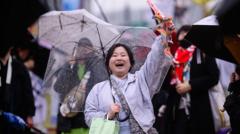South Korea will host an urgent presidential election on June 3, as announced by acting president Han Duck-soo, following the constitutional court's decision to uphold the impeachment of former president Yoon Suk Yeol. Faced with backlash from Yoon’s controversial martial law declaration, which he invoked back in December, Han underscored the necessity for the nation to "quickly heal from the wounds" and progress "upward and forward."
Yoon’s tenure was marred by political controversy and societal divides, leading to his impeachment due to actions many perceived as overreach. Acknowledging the turmoil of the last few months, Han expressed regret for the confusion caused by Yoon's presidency, emphasizing the urgency for a new leadership direction.
Yoon's rationale for martial law was rooted in perceived threats from "anti-state forces" and North Korean provocations. However, it soon became evident that domestic disturbances propelled his decision, which has also led to insurrection charges against him.
Political aspirations are already sparking interest, with labour minister Kim Moon-soo and prominent legislator Ahn Cheol-soo preparing to run. The current frontrunner in public opinion polls is opposition leader Lee Jae-myung, who narrowly lost to Yoon in the previous election.
While the country grapples with Yoon’s divisive legacy, it also faces economic pressures from recently imposed tariffs by the US, potentially impacting exports significantly. As South Korea seeks to navigate through these challenges, the upcoming election marks a critical juncture in redefining its future.
Yoon’s tenure was marred by political controversy and societal divides, leading to his impeachment due to actions many perceived as overreach. Acknowledging the turmoil of the last few months, Han expressed regret for the confusion caused by Yoon's presidency, emphasizing the urgency for a new leadership direction.
Yoon's rationale for martial law was rooted in perceived threats from "anti-state forces" and North Korean provocations. However, it soon became evident that domestic disturbances propelled his decision, which has also led to insurrection charges against him.
Political aspirations are already sparking interest, with labour minister Kim Moon-soo and prominent legislator Ahn Cheol-soo preparing to run. The current frontrunner in public opinion polls is opposition leader Lee Jae-myung, who narrowly lost to Yoon in the previous election.
While the country grapples with Yoon’s divisive legacy, it also faces economic pressures from recently imposed tariffs by the US, potentially impacting exports significantly. As South Korea seeks to navigate through these challenges, the upcoming election marks a critical juncture in redefining its future.


















